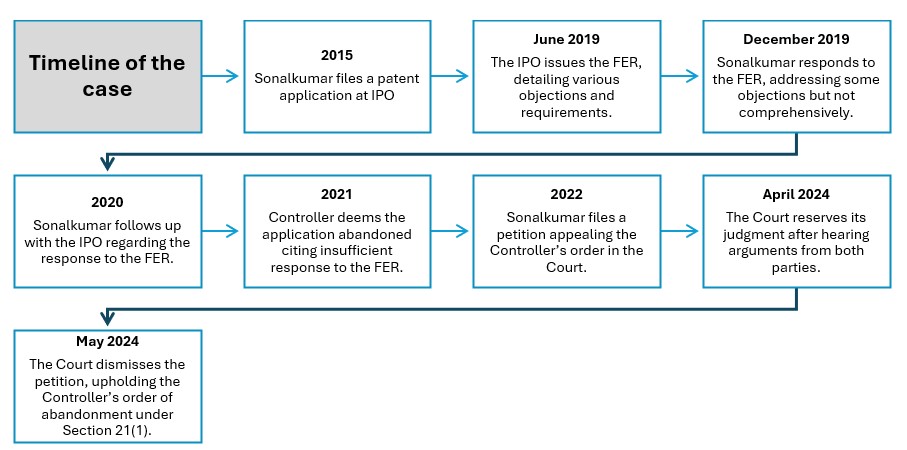
In the case of Sonalkumar Sureshrao Salunkhe & Ors. v The Assistant Controller of Patents, the Bombay High Court underscored the importance of diligently addressing all objections in the First Examination Report (FER) sufficiently, to avoid the risk of a patent application being deemed ‘abandoned’.
Sonalkumar Sureshrao Salunkhe & Anr (Sonalkumar) filed a patent application at the Indian Patent Office (IPO), which subsequently issued a First Examination Report (FER). While Sonalkumar responded, the Assistant Controller of Patents (Controller) found the reply to the FER incomplete.
The Controller contended that Sonalkumar’s reply could not be taken on record under Section 21(1) of the Patents Act, 1970, as there were no substantive technical arguments and/or reasoning provided in response to the objections raised in the FER. Section 21(1) mandates that applicants shall comply with all requirements imposed under the Patents Act, either in connection with the complete specification or in relation to the objections raised in the FER. Failure to provide such detailed responses renders the reply unacceptable, leading to the potential abandonment of the patent application.

In light of this, the Controller further questioned why Sonalkumar’s patent application should not be considered as abandoned and scheduled a hearing. After considering Sonalkumar’s arguments, and written submissions, the Controller refused the application under Section 21(1), arguing that the reply to FER was incomplete, lacked technical arguments or reasoning to address the objections raised in the FER and therefore could not be accepted.
Sonalkumar appealed against the refusal order to the Bombay High Court, arguing that the application should not have been considered as abandoned, since the FER response was filed within the stipulated time and that they had made subsequent efforts to follow-up after filing the response. In defense to this contention, the Controller raised a preliminary objection that an order passed under Section 21(1) of the Act cannot be appealed. In addition, the Controller argued that Section 117A of the Act does not allow for appeals against orders issued under Section 21(1), rendering the appeal as not maintainable.
Sonalkumar countered by stating that if the Controller found the reply unsatisfactory and refused the application, then such a refusal order should be considered as an order under Section 15 of the Act, which is appealable under Section 117A. The Controller countered that the refusal order itself showed that it was passed under Section 21(1), and that the Court had no jurisdiction to decide whether the order was to be passed under Section 21 (1) or under Section 15 of the Act. The Court affirmed that Section 117A of the Act does not allow for an appeal based on orders passed under Section 21(1).
The Court noted that the FER made detailed observations on various requirements under the Act. In contrast, Sonalkumar’s reply addressed only the objection to inventive step, not the rest of the requirements in question. Despite having an opportunity to seek an extension for replying to the FER, Sonalkumar failed to do so and filed an incomplete reply.
The Court analyzed what actions by an applicant amount to a patent application being termed as abandoned. The Court relied on Telefonaktiebolaget LM Ericsson (PUBL) v Union of India (UOI) and Ors., Ferid Allani v Union of India (UOI) and Ors., to state that ‘abandonment’ requires conscious act on the part of an applicant which would manifest the intention to abandon the application. If an applicant had responded to all the objections/requirements raised in the FER, then the condition for attracting ‘abandonment’ would be non-existent, and the case would not fall under Section 21(1) of the Act. However, in the current case, Sonalkumar failed to do respond to all the objections/requirements raised in the FER, whereby implying an intention of abandonment.
In view of the above, the Court held that the refusal order in question qualifies as an order passed under Section 21(1) of the Act. Since Section 117A does not allow for appeal against orders passed under Section 21(1), the Court dismissed the petition.
This judgment emphasizes the importance of addressing all objections in the FER to avoid a patent application being deemed abandoned. Incomplete or delayed responses increase this risk. These ruling underscores the importance of preparing and submitting comprehensive FER responses.

